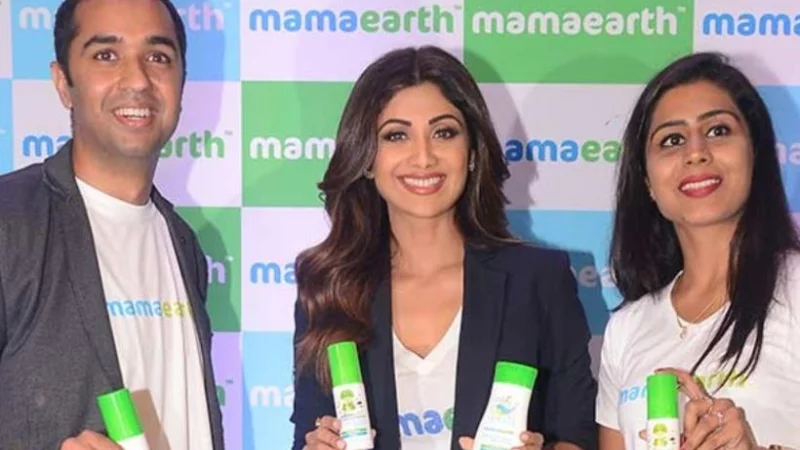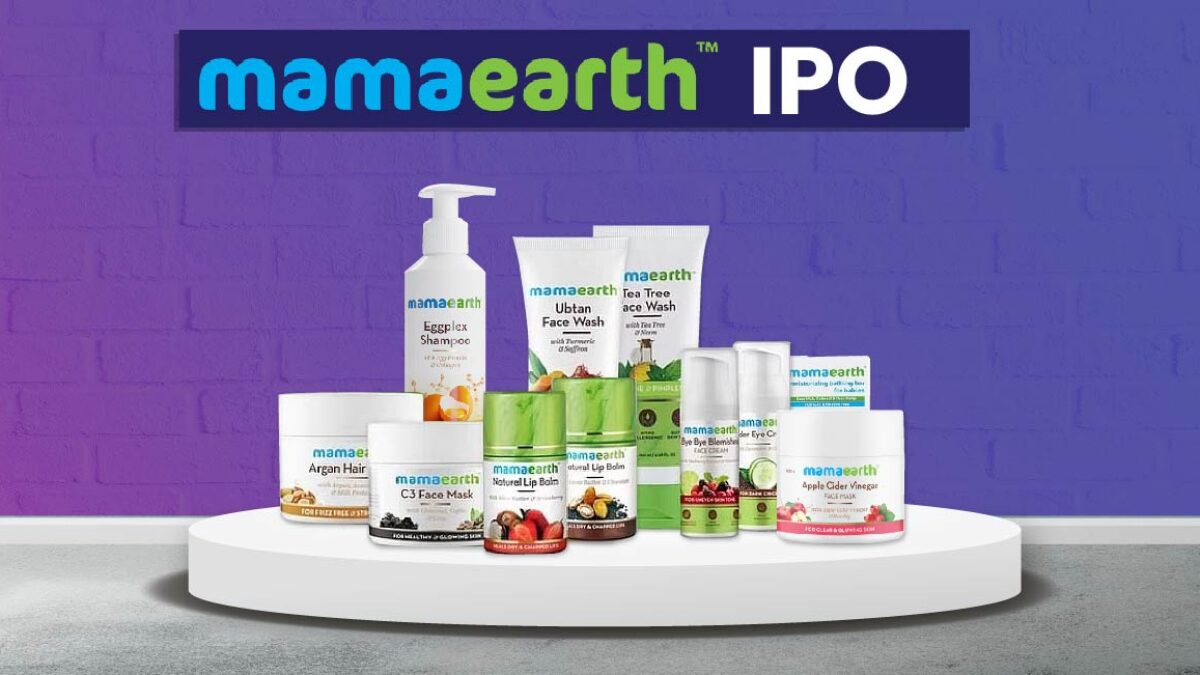Mamaearth IPO- From The Expected Removal Of One Brand From Their Portfolio To Market Challenges And Opportunities- An Inside Look At The Company.
Mamaearth filed for a stock listing in December 2022, with reports claiming a fancied valuation of around $3 billion (about Rs 24,000 crore), sparking a social media spark with analysts and market experts disputing the gigantic figure. As a result, it reduced its estimates to $1.3 billion, or Rs 10,500 crore. This would point to a flattish IPO valuation, as the company was predicted to be worth $1.2 billion in January 2022.

If you are a daily startup news reader, then the news of Mamaearth IPO is not new to you. Mamaearth was the first unicorn of 2022, and fast forward to 1.75 years, it now aspires to be the first new-age firm to go public amid the ongoing funding freeze. Honasa Consumer, famous for the skincare brand Mamaearth, has reduced the size of its IPO by around 10%, as mentioned in the updated red herring prospectus.
The reduction applies to both the primary and secondary share sales, and the same is the maximum permissible by SEBI after IPO approval. The company plans to raise INR 365 crore in primary capital, low from the Rs 400 crore targeted earlier. In the secondary sale, 4.13 million shares will exchange hands instead of 4.68 million. An IPO’s secondary component allows existing shareholders to partially divest their ownership to the public.
Mamaearth filed for a stock listing in December 2022, with reports claiming a fancied valuation of around $3 billion (about Rs 24,000 crore), sparking a social media spark with analysts and market experts disputing the gigantic figure. As a result, it reduced its estimates to $1.3 billion, or Rs 10,500 crore. This would point to a flattish IPO valuation, as the company was predicted to be worth $1.2 billion in January 2022. At the time, a private fundraising round headed by Peak XV Partners, Evolvence Capital, and Sofina Ventures had earned it unicorn status.
Several late-stage investors in the company do not find the IPO pricing appealing and are postponing or selling only a part of their shares.
- Sofina proposes to sell 9.6 million shares, far fewer than the 19.1 million intended initially.
- A comparison of the first and amended prospectuses reveals that Evolvence is not selling its interests. Sofina invested in Mamaearth in 2021 with a valuation of about $730 million, while Evolvence joined later.
- Peak XV is not taking part in the secondary.
The Mamaearth IPO, if successful, will be a great Diwali gift for early-stage investors.
Apart from this, there is an offer for-sale segment of up to 4.12 Cr shares, which would see shareholders like Kunal Bahl, Rohit Kumar Bansal, Rishabh Harsh Mariwala, and Shilpa Shetty Kundra offloading the stakes in the company. While the profitability of founders Varun and Ghazal Alagh-owned Honasa Consumer’s IPO remains unknown, one thing is crystal clear: it has converted into a lucrative call for its pre-IPO investors.
- Snapdeal co-founders Kunal Bahl and Rohit Bansal, were the first supporters of Mamaearth, have also increased the secondary allocation by 50% to about 2.4 million shares. The duo infused their funds in the startup in 2017 when it was valued at only INR 32 crore and held about 1.5% when the IPO filings were submitted. The average weighted acquisition cost for Rohit Bansal and Kunal Bahl is about 3 per share. Both people want to sell almost 12 lakh shares in the IPO, which may result in returns of up to 108 times the initial investments, based on the price band’s upper end.
- Rishabh Mariwala, the one whose family owns consumer goods titan Marico, intends to sell 5.7 million shares, 12X more than the earlier target. Mariwala gave a total of INR 6 crore in the company for ownership of about 3%. He sold shares worth INR 20 crore in previous secondary transactions. Even if Mamaearth’s market debut occurs at a worth of Rs 10,000 crore, the stake will give Mariwala Rs 300 crore, a 50X return.
- Actor Shilpa Shetty Kundra, the very first face of Mamaearth, will offload 2.5 million shares, a rise from 1.4 million. She had earlier sold shares worth INR 62 crore, and her remaining stake is worth INR 50 crore at a valuation of INR 10,000 crore, according to data from business research platform Tracxn. Shilpa Shetty Kundra had an average weighted acquisition cost of INR 42 per share and plans to sell about 14 lakh shares in the IPO, potentially enjoying 8X returns on her investment.

What happens inside the umbrella of the company?
The drop of a brand.
Amid all this IPO news, a topic not seen by many is Honasa Consumer Limited, the parent of Mamaearth, which has many other brands under its umbrella, is expected to have shaken off its hands from its brand Momspresso. The website momspresso.com is unaccessible, and the brand’s Facebook page also shows that the content will not be available on its website and app post-September 30, 2023.
Also, if you click ‘Our Brands’ on Honasa Consumer Limited, you will see that Momspresso is not mentioned under their brands page. Earlier in mid-2023, Momspresso laid off 80-100 employees, and the news came out that the company would shut down Momspresso and MyMoney because of mounting losses. It seems that ahead of the IPO, the company had decided to amputate its costliest acquisition, which eventually became a loss-making vertical.
According to Mamaearth’s RHP, the startup’s BODs chose to “scale down” most of Momspresso’s business verticals. Momspresso recorded a net loss of INR 5.4 Cr in the first quarter of FY24 and INR 21 Cr in 2023. Furthermore, despite management’s best efforts, the business synergies anticipated from the investment were not realised. “The management also presented multiple scenarios with medium to long-term estimates for the acquired business, but none of the scenarios significantly improved profitability profile and any prospect of realising synergies for the core product business,” according to the RHP.

Every step of caution as there is No Room for Loss-Making Entities.
The move to dismiss Momspresso appears part of Mamaearth’s goal to avoid cash-burning subsidiaries ahead of its IPO. Mamaearth’s surviving subsidiaries — BBlunt, B:Blunt Spratt, and Fusion (Dr. Seth’s), remained profitable in the first quarter of the current fiscal year, except Momspresso (Just4Kids Services Private Limited) and Honasa Consumer General Trading LLC.
Interestingly, while Honasa Consumer General Trading LLC recorded a minor loss of INR 40 Lakh in Q1 FY24, Just4Kids handed Mamaearth a loss of INR 5.4 Cr. To make matters worse, Honasa Consumer Limited had to incur a goodwill impairment loss of INR 136 Cr, resulting in a net loss of INR 151 Cr.
Examining Honasa Consumer’s Financial Situation.
In FY23, it generated operating revenue of INR 1,492.7 Cr, up 58% from INR 943.4 Cr in FY22. Furthermore, the group reported INR 464.46 Cr in consolidated revenue from operations for the three months ended June 30, 2023. The net profit for the same time was INR 24.71 Cr.

Mamaearth wiped down INR 136 crore in goodwill for Just4Kids. Overall, it recorded INR 155 Cr in exceptional items before tax in FY23 due to the impairment of goodwill and other intangible assets. Without it, the startup would have made roughly INR 3.7 Cr in net profit during the fiscal year under review. According to Mamaearth’s DRHP, Momspresso’s net value, aka assets minus liabilities, at the time of acquisition was INR 16.2 Cr.
In addition, the D2C unicorn paid INR 136 Cr for “goodwill arising on acquisition.” The startup later raised its share in Momspresso, paying INR 167.9 Cr in total for the deal. Momspresso was founded in 2016 by Vishal Gupta, Prashant Sinha, and Asif Mohammed to provide moms with parenting and pregnancy advice. Women created most of the content in English, Hindi, and eight other regional languages.
Advertising, as with many D2C entities, remains a significant expense. This cost accounted for 35.3% of the total expenditure for Mamaearth-parent and grew 35.5% to Rs 530 crore in FY23. In keeping with the magnitude, material cost increased 58% to Rs 447 crore in FY23. Considering other expenses like employee benefits, information technology, transportation, legal costs, and agency commissions, total expenditure was Rs 1,502 crore, a 59.4% increase from Rs 942 crore in the last fiscal year.
Honasa’s overall cost increase surpassed revenue growth, as evidenced by the figures. Unsurprisingly, this had an impact on the company’s profitability. In context, profits dwindled 71.4% to Rs 4 crore in FY23 from Rs 14 crore in FY22. It is worth mentioning that when computing earnings, we eliminated the unusual item of Rs 155 crore for the impairment loss on goodwill and other intangible assets. Honasa’s ROCE and EBITDA remained positive in FY23, at 2.94% and 2.98%, respectively. On a per-unit basis, it spent Rs 1.01 to generate one rupee of operating revenue.
Regarding revenue generation among the six brands, Mamaearth is one of Honasa’s most profitable. The sales of the company’s top two products, which were sold under the Mamaearth brand, accounted for INR 172.5 Cr or 11.56% of its operational revenue in FY23. Furthermore, the top ten brands under Mamaearth, The Derma Co., Dr Sheth’s, and Aqualogica generated INR 408.68 Cr or 27.38% of operating revenue during the same time.
People at the helm.
As of March 31, 2023, the parent company’s numerous brands had 301 new SKUs and 252 products. Its fundamental strength in recent years has been an omnichannel distribution strategy in addition to its native ecommerce outlets. The company’s current online and offline split is 64.01% and 33.47%, respectively. Honasa had 993 permanent full-time in-house employees as of June 30, 2023. 1,767 contractors and consultants assisted these employees.
According to the RHP, there are five significant managerial professionals in addition to founders Varun and Ghazal. The leadership team has a total of 100 years of professional expertise, and the average employee age is 29 to 30 years.

Challenges and Market Potential.
According to a RedSeer analysis cited in the RHP, the market for BPC products in India is estimated to expand at a CAGR of around 11% from about $20 billion in 2022 to about $33 billion in 2027. The BPC products market lends itself nicely to digital penetration, and the online BPC market, presently valued at $3 billion, is predicted to increase 29% per year to roughly $11 billion by 2027, implying a 34% online penetration.
However, one of the company’s major issues is its reliance on third-party producers. The top three manufacturers contributed 81.95%, 70.97%, and 51.73%, respectively, to the total value of its purchases of traded goods in FY21, FY22, and FY23. It presently collaborates with 37 contract manufacturers. Not only that, but as a direct-to-consumer business, it confronts fierce competition, and a significant portion of its marketing budget is spent on engaging influencers, getting into celebrity endorsement agreements, and maintaining a presence on social media platforms.
The promotional costs incurred in conjunction with its involvement with celebrities and social media influencers in FY21, FY22, and FY23 were INR 22.74 Cr, INR 39.93 Cr, and INR 67.14 Cr, respectively.
Another significant difficulty for the organisation is the ability to develop and retain product differentiation consistently. One of the risk factors mentioned in the company’s RHP is the introduction of new brands and goods. This is due to the company’s concern that consumer tastes cannot be forecast because they change so quickly. Furthermore, the company is unsure whether its new launch will be “commercially viable, effective, or accepted by our consumers,” as is common in the FMCG market.
RHP cites innovation, quality assurance, supply chain, and logistics as a few of its strong qualities. However, the repeated losses over the years may deter individual investors from applying for IPOs.
Conclusion.
Having said that, the Indian startup ecosystem has gradually begun to emerge from the financial winter, and tech stocks are projected to witness good development under global market stability. The Mamaearth listing, as one of the most anticipated startup IPOs of the year, comes with high expectations, but how successfully these expectations are met will be revealed in less than two weeks.
Mamaearth’s IPO would be a true test of validity for the Indian D2C community, and as such, many eyes will be on the listing. Mamaearth’s IPO will be a crucial barometer of market sentiment for unicorns Swiggy, Ola Electric, and FirstCry, all of which want to go public within the following twelve months.




